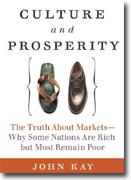John Kay
book reviews:
· general fiction
· chick lit/romance
· sci-fi/fantasy
· graphic novels
· nonfiction
· audio books
· author interviews
· children's books @
curledupkids.com
· DVD reviews @
curledupdvd.com
newsletter
win books
buy online
links
home
for authors
& publishers
for reviewers

 |
Culture and Prosperity: The Truth About Markets - Why Some Nations Are Rich but Most Remain Poor John Kay HarperBusiness Hardcover 432 pages May 2004 |
|
Itís obvious to all but the delusional that thereís an inequality in the worldwide distribution of wealth. Some may defend it, some may mourn it, but itís plain to see in any issue of National Geographic. John Kayís heftily subtitled book Culture and Prosperity claims to show why these inequalities exist - a hopeful notion.
Kay does love his theories and tries to simplify them through examples. When he obtains examples from the real world, the approach sometimes works, although he has an odd talent for taking the immediacy from even the most topical subject. When he is driven to invent his own examples, the results are often laughable, as in an early discussion of worldwide ďaverage incomesĒ using people with names so ethnic they may be trademarked, and with job/income ratios that only illustrate how far removed the study of economics is from its effects. Those examples which are successful deal with small phenomenon, rather than the large trends of the book, and lose some credibility from Kayís own invented narratives. Most disappointing is that, despite the epic subtitle, Culture and Prosperity never finds a unifying theme. One theory after another is discussed, in unmemorable detail, without the answers ever being tied together. Those stalwarts who plow through the entire book may remember the rules that govern supermarket checkout lines, or take away a better understanding of the Dutch tulip craze, but the initial question is lost moments after the intro, making only cameo appearances throughout the rest of the book. Itís a shame that Culture and Prosperity is so scattered, because it addresses a subject worthy of focused attention. Nor is there any reason for economics to be boring. John Kay has found it interesting enough to occupy most of his life. Sadly, like many true fans, he canít convey the essence of that which has so fascinated him. © 2004 by Sarah Meador for curledup.com. |
|
|
|
 Click here to learn more about this month's sponsor! |
|
| fiction · sf/f · comic books · nonfiction · audio newsletter · free book contest · buy books online review index · links · · authors & publishers reviewers |
|
| site by ELBO Computing Resources, Inc. | |
 Kay tries to fulfill the bookís mission armed with a deep passion for economics and a missionary zeal to infect others with that passion. It should make for an approachable book. The problem is that Kay loves his subject a bit too much. Heís not just fond of mathematics; heís a diehard fan. And like fans of any stripe ó television shows, comics, sports, even books ó he canít seem to tell the difference between what will be of general interest and what will matter only to a select few. His knowledge of the subject also serves to blind him to the confusion of others, even while he clearly knows his understanding is above average. The result of these warring attitudes is a book that struggles to find its voice. One paragraph is written at level insulting to a high school economics textbook; the next may soar off into discussions of obscure theories known only to doctorates in science, with no middle ground. Itís an approach that will irritate readers of every level.
Kay tries to fulfill the bookís mission armed with a deep passion for economics and a missionary zeal to infect others with that passion. It should make for an approachable book. The problem is that Kay loves his subject a bit too much. Heís not just fond of mathematics; heís a diehard fan. And like fans of any stripe ó television shows, comics, sports, even books ó he canít seem to tell the difference between what will be of general interest and what will matter only to a select few. His knowledge of the subject also serves to blind him to the confusion of others, even while he clearly knows his understanding is above average. The result of these warring attitudes is a book that struggles to find its voice. One paragraph is written at level insulting to a high school economics textbook; the next may soar off into discussions of obscure theories known only to doctorates in science, with no middle ground. Itís an approach that will irritate readers of every level.